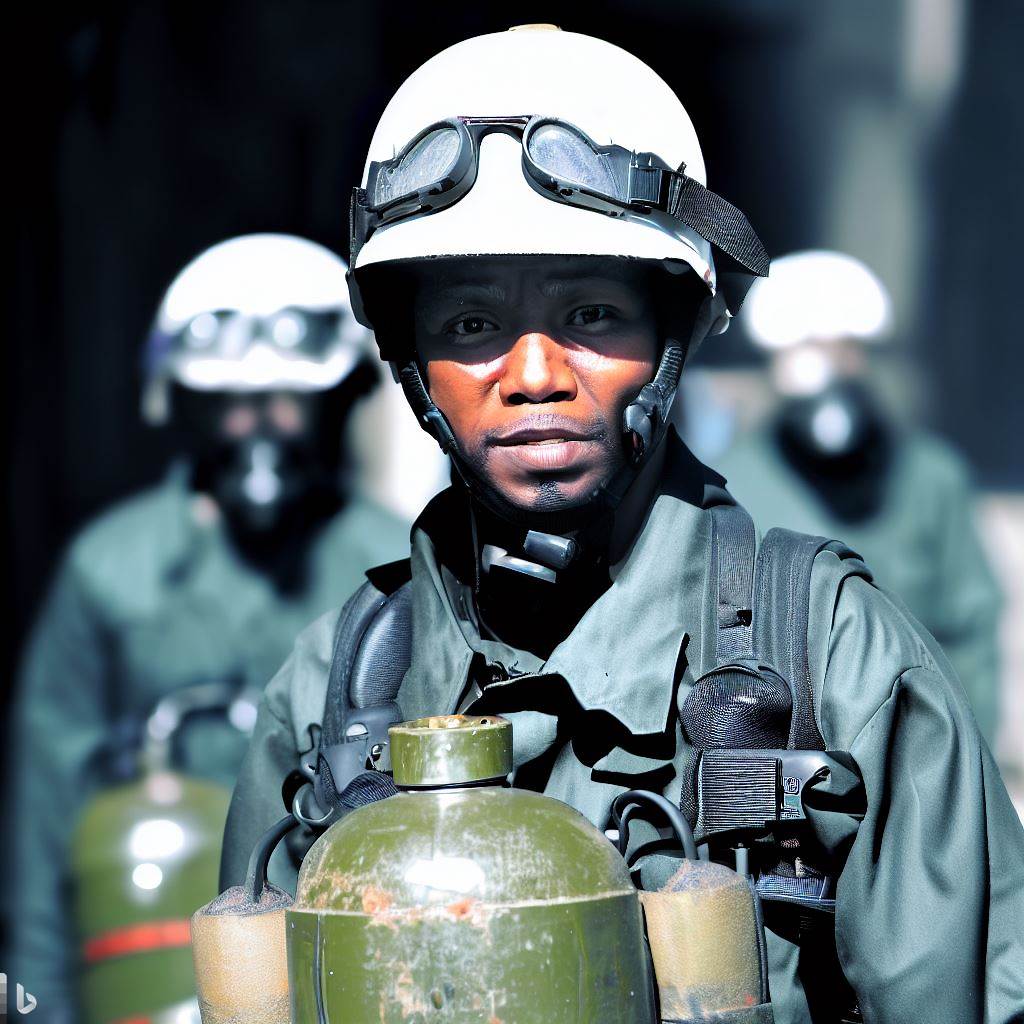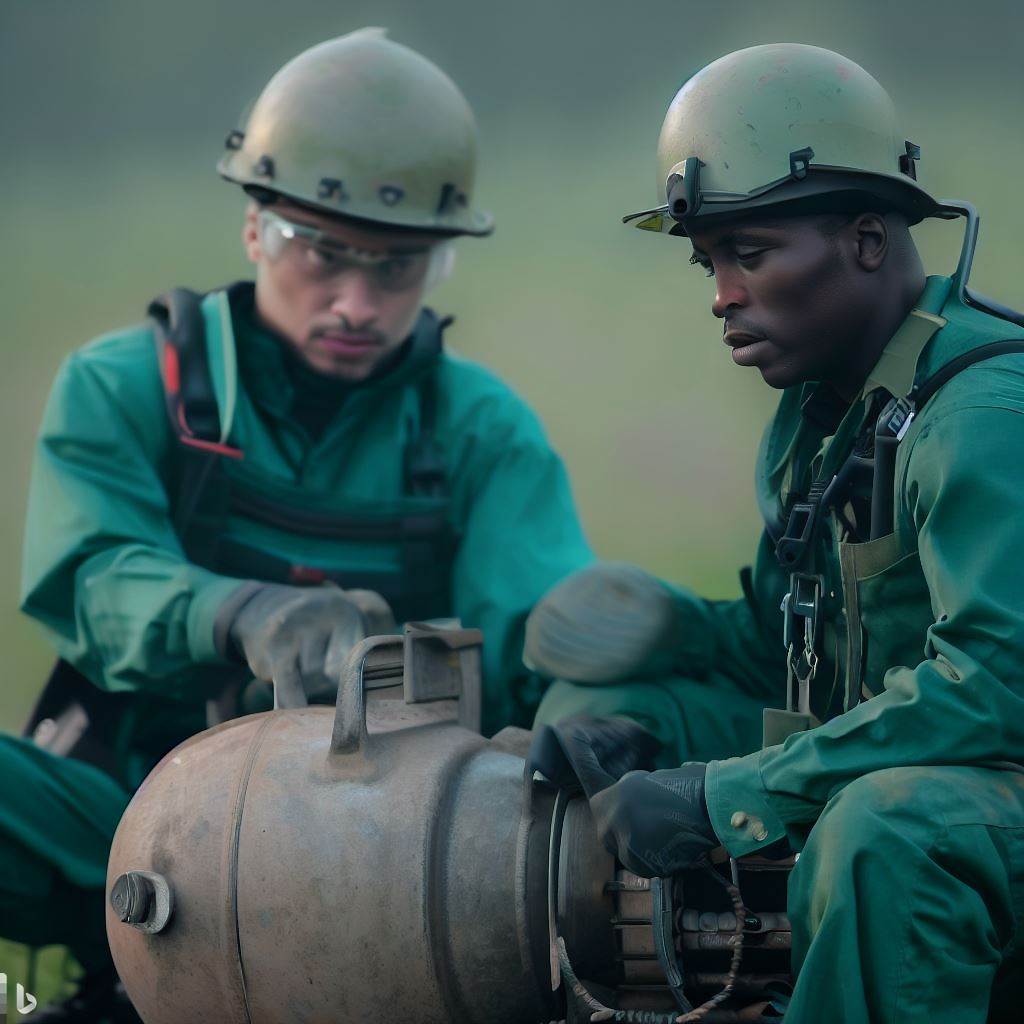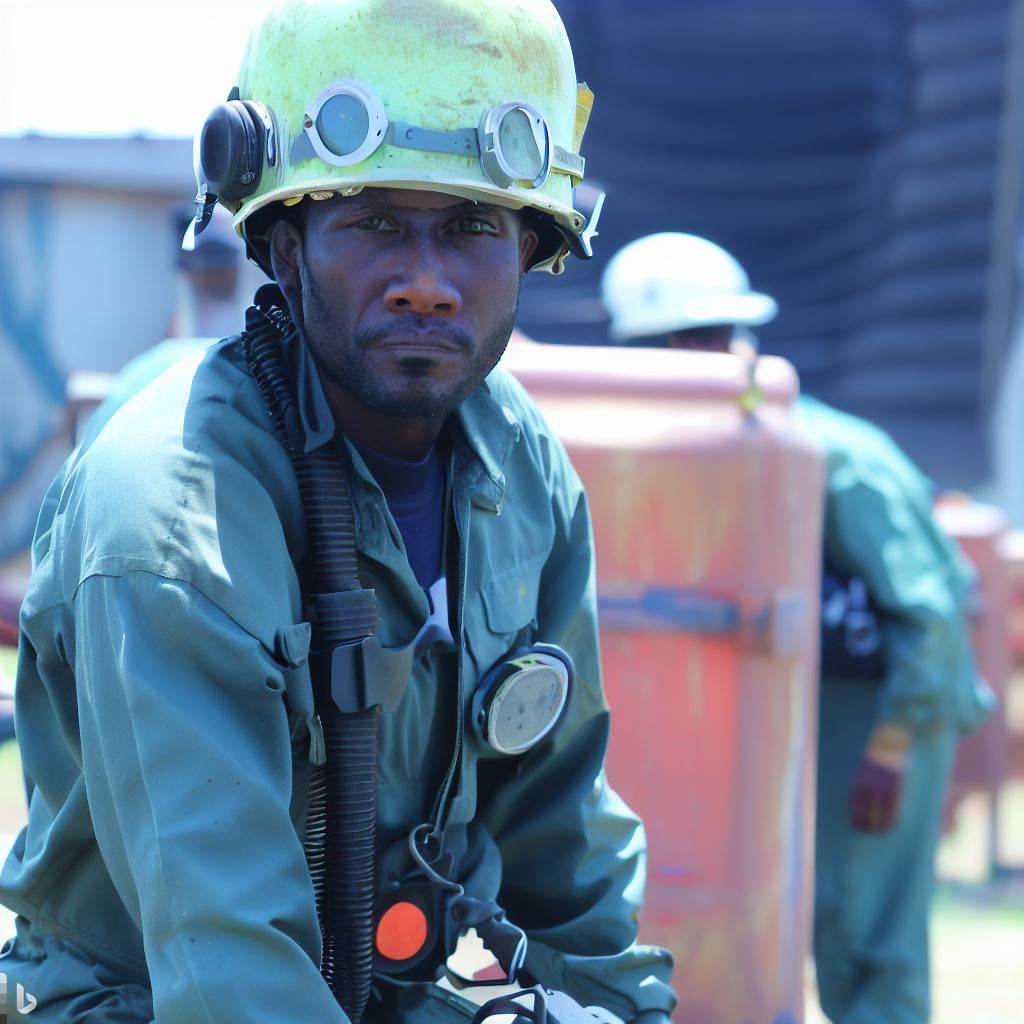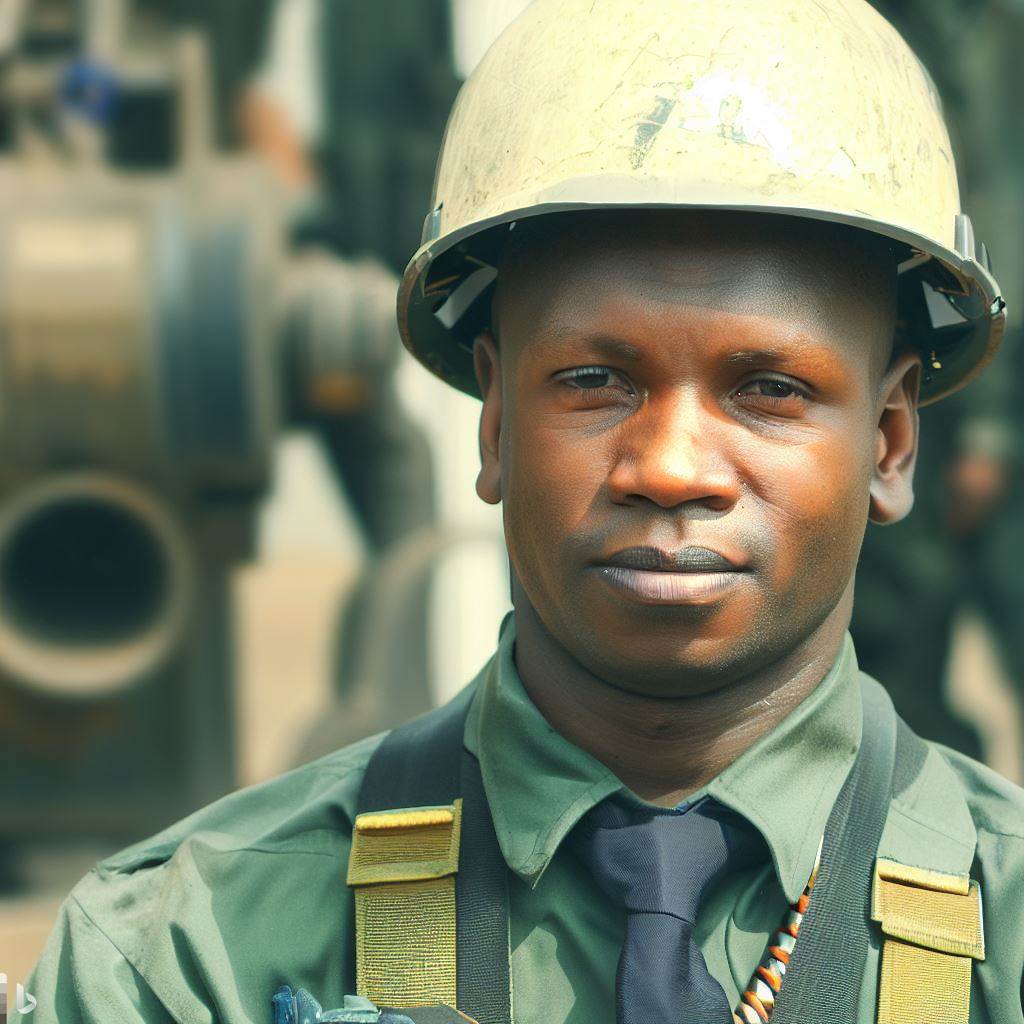Introduction
The topic of veterans in bomb disposal in Nigeria is crucial and relevant in today’s world.
Discussing this issue holds immense importance as it sheds light on the challenges faced by these courageous individuals and the impact they have on national security.
Nigeria, like many other countries, deals with the constant threat of terrorism, making it essential to understand the role of veterans in bomb disposal.
Exploring their expertise and experiences can provide valuable insights into the measures required to combat such threats effectively.
Additionally, recognizing the contributions of these veterans can help create a supportive environment that addresses their needs and ensures their continued success in safeguarding the nation.
By discussing veterans in bomb disposal, we emphasize the significance of their service, raise awareness about their sacrifices, and encourage the recognition they rightfully deserve.
Background of bomb disposal in Nigeria
History and development of bomb disposal in Nigeria
Bomb disposal in Nigeria has evolved over the years to address the growing threat of explosives. The practice began in the early 1970s, following a wave of bombings during the Nigerian Civil War.
The Nigerian Army established the Explosive Ordnance Disposal (EOD) unit to handle explosive threats.
Bomb disposal techniques were initially learned from international partners like the United States and the United Kingdom.
Over time, Nigerian EOD personnel gained expertise through training and hands-on experience.
They developed their own methods, incorporating local knowledge and adapting to the specific challenges in the country.
Challenges and issues faced by bomb disposal units in the country
- Insurgency and terrorism have increased the demand for bomb disposal services in Nigeria.
- The Boko Haram insurgency, in particular, has been responsible for a significant number of bomb attacks.
- Nigeria’s size and diverse geographical terrain pose challenges for bomb disposal units.
- Remote areas with limited infrastructure make it difficult to quickly respond to explosive threats.
- Bomb disposal units often face inadequate funding, equipment, and technology, hindering their effectiveness.
- Inadequate training and manpower shortages present obstacles for bomb disposal units.
- There is also a lack of public awareness and education about explosive hazards, putting communities at risk.
In fact, bomb disposal in Nigeria has evolved since its inception, with the development of local expertise and techniques.
However, challenges such as insurgency, geographic obstacles, and limited resources continue to impact bomb disposal units.
Addressing these challenges through increased funding, training, and public awareness is crucial for the safety and security of Nigeria.
Read: Career Growth and Opportunities in Bomb Disposal in Nigeria
Role of veterans in bomb disposal
The significance and experience veterans bring to bomb disposal
When it comes to bomb disposal, veterans play a crucial role due to their significance and experience.
Veterans bring a wealth of knowledge and expertise to bomb disposal operations.
Their years of military service provide them with a deep understanding of the complexities and dangers involved in handling explosive devices.
Additionally, veterans have firsthand experience in combat situations, which helps them make informed decisions and effectively assess threats.
Specialized skills and training acquired by veterans
Moreover, veterans have specialized skills and training that make them invaluable in bomb disposal.
Through their military career, veterans receive intensive training in handling explosives, including identifying different types of bombs and devices.
They learn about bomb construction, placement methods, and the various tools and techniques used in disarmament.
These specialized skills allow veterans to approach bomb disposal with precision and confidence.
Importance of their mental and physical resilience
Furthermore, the importance of mental and physical resilience cannot be underestimated in bomb disposal.
Veterans, through their military service, have developed exceptional mental toughness and problem-solving abilities.
They understand the importance of remaining calm and composed under pressure, which is crucial in bomb disposal operations.
Moreover, veterans have undergone rigorous physical training, making them physically fit for the demanding tasks involved in bomb disposal.
In essence, veterans bring significant experience, specialized skills, and mental and physical resilience to bomb disposal operations.
Their expertise and training make them indispensable in identifying and neutralizing explosive devices, ensuring the safety and security of the community.
Read: Legal Requirements for Bomb Technicians in Nigeria
Training and Education for Bomb Disposal Veterans
In order to effectively contribute to bomb disposal operations, veterans in Nigeria have access to specific training programs and educational opportunities.
Training Programs
Veterans in bomb disposal can participate in various training programs aimed at enhancing their skills and knowledge. Some of these programs include:
- Explosive Ordnance Disposal (EOD) Training: This program focuses on identifying, neutralizing, and disposing of explosive hazards safely and effectively.
- Advanced Improvised Explosive Device (IED) Electronics Training: Veterans can acquire advanced knowledge of IED electronics to efficiently counter and disable these devices.
- Post-Blast Investigation Training: This program equips veterans with the skills necessary to investigate and analyze the aftermath of a bomb explosion.
By participating in these training programs, veterans enhance their ability to handle bomb threats and protect civilian lives.
Educational Opportunities and Certifications
Education plays an important role in the professional development of bomb disposal veterans in Nigeria.
- Bachelor’s Degree in Explosive Ordnance Disposal: Veterans have the opportunity to pursue a specialized degree in bomb disposal, which provides a comprehensive understanding of various explosive devices and their disposal techniques.
- Technical Certifications: Veterans can obtain industry-recognized certifications such as Certified Explosives Specialist (CES) or Certified Bomb Technician (CBT), which validate their expertise and enhance their employability.
- Continuing Education Programs: Various institutions offer continuing education courses specifically designed for veterans to ensure they stay updated with the latest technological advancements and best practices in bomb disposal.
These educational opportunities and certifications contribute to the professional growth of veterans, enabling them to tackle complex bomb threats more effectively.
Continuous Learning and Improvement
Being a bomb disposal veteran requires a commitment to continuous learning and improvement. This field constantly evolves, demanding veterans to stay updated with the latest advancements and techniques.
Veterans are encouraged to engage in the following activities:
- Attending Workshops and Conferences: Participating in workshops and conferences allows veterans to network with experts, share experiences, and gain insights into emerging trends in bomb disposal.
- Participating in Simulation Exercises: Regular participation in simulation exercises helps veterans sharpen their skills in handling various bomb threat scenarios, ensuring quick and precise response during real-life incidents.
- Continual Skills Assessment: Veterans undergo periodic skills assessment tests to identify areas that require improvement, enabling targeted training and development opportunities.
By embracing continuous learning and improvement, bomb disposal veterans in Nigeria can adapt to the dynamic nature of their work and enhance their effectiveness in safeguarding communities.
Overall, the training programs, educational opportunities, and continuous learning initiatives available for bomb disposal veterans in Nigeria equip them with the necessary skills, knowledge, and certifications to excel in this demanding field.
Through their dedication and ongoing commitment to growth, these veterans contribute immensely to the safety and security of their nation.
Read: Women in Bomb Disposal: Breaking Barriers in Nigeria
Contributions of Veterans in Bomb Disposal
Various roles and responsibilities veterans take on in bomb disposal operations
- Veterans play a crucial role in bomb disposal operations, utilizing their specialized training and experience.
- They are responsible for identifying and assessing potential explosive devices, ensuring the safety of civilians and fellow team members.
- Veterans take charge of coordinating response teams, providing guidance and leadership in high-pressure situations.
- They are trained to analyze bomb threats and develop strategies to neutralize or safely remove explosive devices.
- Their roles include conducting thorough investigations, gathering intelligence, and assessing potential threats for mitigation purposes.
Their expertise in handling complex situations and diffusing explosive devices
- Veterans possess extensive knowledge in handling a wide range of explosive devices, including improvised explosive devices (IEDs).
- Their expertise lies in disarming explosives, utilizing specialized tools, and employing advanced techniques to ensure a safe outcome.
- Veterans understand the intricacies of bomb components and are skilled in rendering them harmless without detonation.
- They excel in deciphering complex bomb mechanisms, enabling them to devise effective procedures for defusing the threat.
- Their expertise extends to dealing with chemical, biological, radiological, and nuclear (CBRN) threats, mitigating potential disasters.
Examples of successful bomb disposal operations led by veterans
- In a recent operation, a team of veterans successfully neutralized a highly volatile explosive device planted at a crowded market.
- Utilizing their knowledge and experience, they swiftly executed a controlled detonation, preventing any casualties.
- In another instance, veterans led a complex mission to dispose of an outdated military ordinance, minimizing the risk of accidental detonation.
- Their expertise in handling such critical operations ensured the safety of the surrounding community.
- Veterans have consistently demonstrated their ability to handle various bomb disposal situations with precision and professionalism.
The contributions of veterans in bomb disposal operations are invaluable. Their roles encompass a wide range of responsibilities, from assessing potential threats to disarming explosive devices.
With their expertise in handling complex situations and defusing bombs, veterans play a crucial role in ensuring the safety of communities.
Read: Bomb Disposal Equipment: Tools Used in Nigeria

Delve into the Subject: Life as a Military Officer’s Spouse in Nigeria
Challenges and Support for Veterans in Bomb Disposal
In the treacherous field of bomb disposal, veterans face numerous physical and mental challenges that require proper support systems and resources for their well-being.
Physical Challenges
- Constant exposure to life-threatening situations puts extreme physical strain on veterans.
- The physical demands of wearing heavy protective gear and carrying specialized equipment are immense.
- Long hours of work, often in hazardous environments, take a toll on the physical endurance of bomb disposal veterans.
- Handling explosives and conducting delicate procedures require precise coordination, agility, and strength.
- The inherent risks involved in bomb disposal missions pose imminent dangers to the physical safety of veterans.
Mental Challenges
- Bomb disposal veterans frequently experience high levels of stress, anxiety, and post-traumatic stress disorder (PTSD).
- The constant need for vigilance and the fear of personal harm or failure can lead to chronic psychological distress.
- Witnessing traumatic events and dealing with the aftermath of explosions can lead to emotional trauma.
- The responsibility of making split-second life-or-death decisions weighs heavily on the mental well-being of veterans.
- Recurring nightmares, intrusive thoughts, and difficulties in social relationships are common psychological challenges faced by bomb disposal veterans.
Importance of Support Systems and Resources
Recognizing the importance of support systems and resources for the well-being of veterans in bomb disposal cannot be overstated.
- Proper support systems help veterans cope with the physical and mental demands of their high-risk profession.
- Access to counseling services, therapy, and mental health professionals is crucial in addressing psychological challenges.
- Regular health check-ups and physical fitness programs can help veterans maintain their physical well-being.
- Creating a supportive work environment that encourages open communication and teamwork is vital.
- Providing educational opportunities and skill enhancement programs assists veterans in transitioning to civilian life.
Initiatives and Programs
Several initiatives and programs have been implemented to assist veterans in overcoming the challenges they face in bomb disposal.
- The establishment of dedicated veteran support organizations provides a platform for veterans to seek assistance and share experiences.
- Veterans’ associations collaborate with mental health professionals to offer specialized therapy and rehabilitation programs.
- Government-funded initiatives aim to improve the overall well-being of veterans, including access to healthcare and financial support.
- Training programs and workshops focus on equipping veterans with transferable skills and knowledge for post-military careers.
- Mentorship programs connect veterans with experienced professionals who can provide guidance and support during their transition.
By prioritizing the physical and mental well-being of veterans in bomb disposal, the challenges they face can be mitigated, and their successful reintegration into civilian life can be facilitated.
Success stories of veterans in bomb disposal in Nigeria
Stories of individual veterans who have made significant contributions to bomb disposal in Nigeria
Major John Ajala
A retired army officer who defused numerous bombs during his service. Ajala’s achievements saved countless lives and ensured the safety of communities throughout Nigeria.
His expertise and dedication in bomb disposal resulted in a significant reduction in terrorist attacks. The government awarded Major Ajala with the Medal of Bravery for his exceptional service.
His impact on national security has been widely recognized, and he serves as an inspiration to aspiring bomb disposal experts.
Lieutenant Amina Mohammed
A highly skilled veteran who specialized in bomb detection and disposal. She successfully neutralized several bombs planted by extremist groups, preventing devastating attacks.
Lt. Mohammed’s quick thinking and bravery made her an invaluable asset in the fight against terrorism. Her outstanding accomplishments earned her the prestigious Nigerian Defence Meritorious Service Medal.
The public showered her with gratitude, applauding her selflessness and commitment to national security.
Colonel Yusuf Bello
A renowned bomb disposal expert with an exceptional track record. He single-handedly disarmed a car bomb that could have caused massive destruction in a crowded market.
Col. Bello’s courageous act received national acclaim, and he was honored with the Order of the Federal Republic.
His remarkable dedication to protecting citizens from explosive threats has made him a respected figure in Nigeria.
Sergeant Fatima Ibrahim
A highly decorated veteran who played a pivotal role in bomb disposal operations. She defused countless improvised explosive devices (IEDs) and trained other soldiers in bomb detection techniques.
Sgt. Ibrahim’s remarkable skills and unwavering commitment were recognized with the Distinguished Service Star.
Her tireless efforts in securing public spaces have made her a hero in the eyes of Nigerians.
Their achievements and impact on national security
These veterans’ success stories in bomb disposal highlight the invaluable contributions they have made to Nigeria’s national security.
Their achievements go beyond saving lives; they have instilled a sense of hope and safety in communities that were once under constant threat.
Recognition and appreciation received by these veterans from the government and society
The efforts of veterans like Major Ajala, Lieutenant Mohammed, Colonel Bello, and Sergeant Ibrahim have not gone unnoticed by the government and society.
The Nigerian government recognizes the bravery and expertise of these veterans, honoring them with prestigious awards and medals.
Such recognition from the government serves as a testament to the vital role played by these veterans in safeguarding the nation.
It showcases the immense trust placed in their abilities and the importance of their contributions.
Society, too, holds these veterans in high regard. Their selfless acts have earned them the admiration and gratitude of the public.
Their stories circulate through various media channels, inspiring others to pursue careers in bomb disposal and national security.
Furthermore, the impact of these veterans extends far beyond their individual achievements.
Their expertise has been shared through training programs, equipping new generations of bomb disposal experts with essential skills and knowledge.
The success stories of veterans in bomb disposal in Nigeria serve as a reminder of the bravery, dedication, and sacrifice displayed by these individuals.
Their significant contributions to national security deserve continued recognition and appreciation, ensuring their legacy lives on as an inspiration for future generations.
Conclusion
Veterans in bomb disposal play a crucial role in Nigeria’s security. Their expertise and bravery are invaluable in neutralizing threats and keeping citizens safe.
It is important to recognize and support these veterans for their tireless service.
Continued support for bomb disposal veterans is necessary to ensure their well-being and motivation to carry out their duties.
They possess specialized skills and experiences that cannot be easily replaced. Nigeria should prioritize the welfare and recognition of these heroes.
It is imperative for readers to view bomb disposal veterans as true heroes in the country. Their dedication to keeping the nation safe deserves utmost respect and admiration.
By appreciating their sacrifices, we can create a society that cherishes those who selflessly serve.
Let us always remember the importance of veterans in bomb disposal, highlighting their role in Nigeria’s security.
Let us continue to provide the necessary support and recognition they deserve, valuing them as true heroes in our country.




